|
|
|
Sort Order |
|
|
|
Items / Page
|
|
|
|
|
|
|
| Srl | Item |
| 1 |
ID:
115051
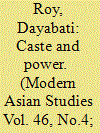

|
|
|
|
|
| Publication |
2012.
|
| Summary/Abstract |
This paper explores the institution of caste and its operation in a micro-level village setting of West Bengal, an Indian state, where state politics at grass roots level is vibrant with functioning local self-government and entrenched political parties. This ethnographic study reveals that caste relations and caste identities have overarching dimensions in the day-to-day politics of the study villages. Though caste almost ceases to operate in relation to strict religious strictures, under economic compulsion the division of labour largely coincides with caste division. In the cultural-ideological field, the concept of caste-hierarchy seems to continue as an influencing factor, even in the operation of leftist politics.
|
|
|
|
|
|
|
|
|
|
|
|
|
|
|
|
| 2 |
ID:
115052
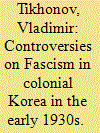

|
|
|
|
|
| Publication |
2012.
|
| Summary/Abstract |
The paper deals with the trends of fascist and fascist-like right-wing social and political thought in colonial Korea in the early 1930s. It shows that in the 1920s, Korea's right wing, its ability to reach out to the masses being severely limited, preferred mostly conciliatory tactics in its relationship with leftist radicals, often making efforts towards inventing 'hybrid' ideologies which would integrate the leftist social concerns into the mainstream religious or nationalist constructions (an example of such a hybrid were various Korean versions of Christian socialism). After the Great Depression, however, Korea's nascent bourgeoisie felt more threatened and became more interested in keeping abreast with right-wing extremist trends in the mother country (Japan) and elsewhere. Such representative ideologists of the Korean propertied class as Yun Ch'iho and Yi Kwangsu were praising Mussolini and employing strong Social Darwinist language in their exhortations to the Korean people to 'regain their vitality and develop [a] spirit of collectivism, obedience and self-sacrifice'. However, until the very end of the 1930s many of Korea's right-wing ideologues remained pronouncedly religious (Yun as Christian, Yi as Buddhist). While highlighting the religious essentials of their worldviews they often abstained from imitating the most extremist traits of European fascist ideologies (for example, anti-Semitism). In many ways, Korea's fascism continued until the end of the 1930s to be an intellectual discourse rather than a mass movement, and retained a strong aura of belonging to more mainstream religious or nationalist traditions.
|
|
|
|
|
|
|
|
|
|
|
|
|
|
|
|
| 3 |
ID:
115053
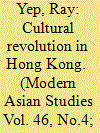

|
|
|
|
|
| Publication |
2012.
|
| Summary/Abstract |
The rule of law has always been cherished as one of the key institutions central to the successful transformation of Hong Kong from 'a barren rock' into a global city. The colonial administration's respect for the principles of the rule of law, however, has been tested by sporadic political turbulence during the 150 years of British rule. Due process of law and other key principles of English laws have been compromised by political expediency when the colonizers felt threatened by challenges from various sources. The 1967 Riots was one of those difficult times. Despite the facade of public support for firmness against disturbances enjoyed by the colonial government, the exercise of some of these emergency powers, particularly the powers to detain and deport, remained highly controversial. With normalization of the Anglo-Chinese relationship in mind, the confrontation prisoners constituted a stumbling block for renewing the friendship with Beijing. The various attempts made by London at pressurizing the Hong Kong government for early release of these prisoners attest to the prevalence of political expediency over the respect for the rule of law under colonial rule.
|
|
|
|
|
|
|
|
|
|
|
|
|
|
|
|
| 4 |
ID:
115050


|
|
|
|
|
| Publication |
2012.
|
| Summary/Abstract |
This paper examines the relationship between ethnic configuration and state social policy in a Chinese context. Why did the Chinese communist government have to implement a preferential policy towards ethnic minorities, and to what extent has this policy come to reshape peoples' consciousness of their group membership? As well as analysing the reasons and intents of the Chinese Communist Party when dealing with the minority issue before and after it attained power, this paper argues that categorizing of the population served to establish the state apparatus. Why the project of ethnic identification was first initiated in Fujian (a province best known for its overwhelming Han culture) is also discussed. By unfolding the process of searching for ethnic representation in Fujian in the early 1950s, this paper further argues that the major concern of the party-state regarding ethnic minorities is to hold onto its power. Finally, this paper documents how government agents, when investigating ethnicity, interacted with the local population. The Fujian case implies as well as exemplifies how ethnicity can be invented, constructed or reconstructed as a particular representation in relation to state formation.
|
|
|
|
|
|
|
|
|
|
|
|
|
|
|
|
| 5 |
ID:
115047
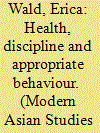

|
|
|
|
|
| Publication |
2012.
|
| Summary/Abstract |
Anxiety about the intemperance and misbehaviour of the European soldiery in nineteenth century India prompted a raft of regulations which not only imposed a punitive regime on those living and working in and around the cantonments, but prompted an extension of military space. This paper specifically examines the methods and levels of control-both of which existed and were attempted in and around the cantonment. These ranged from regulations enacted to order the physical space of the cantonment, to calls for a more direct control over the bodies of the soldiers themselves as well as the numerous others who occupied the land. Crucially for this argument, moral and medical concerns were of critical importance in moulding this ordering. However, as this paper argues, social and class perceptions of the men-and the fear of provoking their wrath-dictated what officers and officials felt was legally possible. The various ways in which the military and government imposed order on the cantonment (or attempted to do so) had serious implications for the shaping of the empire itself and European understanding of its inhabitants.
|
|
|
|
|
|
|
|
|
|
|
|
|
|
|
|
| 6 |
ID:
115046


|
|
|
|
|
| Publication |
2012.
|
| Summary/Abstract |
The Irish in India present an interesting case. Arguably a colonized people, the colonies of the British Empire ironically afforded them employment and profit on a large scale. Although studies have been made of Irish administrators, it was Irish soldiers that were most numerous and it is the 'stereotyped' Irish soldier who represents his nation in depictions of the colonial military. This paper first summarizes the Irish military involvement in India. The reasons why men joined the army in large numbers and, in particular, why they sought service in India, are explored. The regimental culture into which they were absorbed is also examined. The representation of Irish soldiers in officers' writings, both in fiction and popular media, is then discussed. The various aspects of the stereotype surrounding them are delineated, and the purposes of the colonial state served by their stereotypical representation are explained. Lastly, the reactions of Irish soldiers to their stereotype label are discussed. There were advantages to be gained from acting up to it, but it is argued also that soldiers found ways of rejecting bad or rebellious aspects of the stereotype and, by drawing on the 'good' or loyal aspects, helping to establish their own identity. Hence they manage to sustain and reconcile multiple national affiliations. Ultimately, however, the politics of Irish independence precipitates a crisis of identity which makes their position impossible. The paper concludes by considering the lives and memories of veterans of Indian service, and hence the afterlife of the Irish military identity beyond Irish independence.
|
|
|
|
|
|
|
|
|
|
|
|
|
|
|
|
| 7 |
ID:
115048
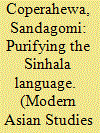

|
|
|
|
|
| Publication |
2012.
|
| Summary/Abstract |
This paper provides a detailed account of the socio-political dynamics of the campaign for Sinhala language purism in the 1930s and early 1940s, and re-evaluates the impact of the Hela (pure Sinhala) movement of Munidasa Cumaratunga (1887-1944), a language loyalist and the foremost grammarian of the twentieth century, for the renovation of Sinhala language. It explores Cumaratunga's discourse on linguistic purism, its ideological foundations, and the means by which he organized his puristic intervention. As the case of Cumaratunga indicates, his language purism was not undertaken for the mere love of a language. The paper argues that Cumaratunga's Hela language movement was essentially a revolt against the dominant language practices and ideologies of the colonial government, national political leadership, the pirivena and the contemporary literary elite of the time. Ideologically, the Hela notion was designed as an oppositional discourse to the dominant Indo-Aryan linguistic discourse in the 1930s, and aimed to locate the Hela language at the apex of colonial language hierarchy. Exploring Cumaratunga's perceptions of language this paper demonstrates linguistic purism as a type of language reform which aimed at the formation of the ethno-linguistic uniqueness of the Sinhalese and the politicization of the Sinhala language in the early 1940s.
|
|
|
|
|
|
|
|
|
|
|
|
|
|
|
|
| 8 |
ID:
115049


|
|
|
|
|
| Publication |
2012.
|
| Summary/Abstract |
Westernization is a pervasive modern phenomenon. Its impact is more pervasive and pernicious than many people are aware and/or willing to admit. The spread of the dominant Western culture has caused a gradual demise of many peripheral cultures. The incursion of Western agents into Naga soil, beginning with British military conquest and American missionary intrusion, has resulted in a significant influence and westernization of Nagas and their culture and worldview. Consequently, it is almost a cliché to assert that since colonial contact the long-evolved Naga traditional values are being replaced by Western values. Today, the literal colonization of Nagas by the imperial West has ended, but the process of westernization is continuing, thanks to the ongoing influence being exerted by modern media, technology and other trends of globalization. My objective in this paper is not to highlight the 'form' or 'material' aspect of the culture, such as clothing (although mimicry in this area is almost faultless among a large section of Nagas), rather, my goal is to discuss the current state of mindset and fundamental cultural structures of the Nagas that have resulted from the adjustments in the lives and minds of the people because of the imposition of westernization. In fact, it is more than merely a process of adjustment consequent upon conquest, it is an extensive overhauling of cultural institutions, values and practices. I will underscore the westernization of some basic social structures and the mindset of the people.
|
|
|
|
|
|
|
|
|
|
|
|
|
|
|
|
| 9 |
ID:
115054
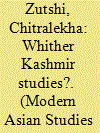

|
|
|
|
|
| Publication |
2012.
|
| Summary/Abstract |
This paper explores the current state of the field of Kashmir Studies and argues that, whilst scholarship on Kashmir has come a long way since the decades after Indian independence and partition, the political situation in the region continues to cast a long shadow over writings on Kashmir. Nevertheless, and despite the continued difficulties associated with research within Kashmir, a new generation of scholars has emerged at the turn of the twenty-first century, whose writings transcend geographical and political determinism as well as the discourse of Kashmiri exceptionalism, to present Kashmir as a complex, but not unique, entity, that has been shaped by multiple influences. In addition, this scholarship explores the ideas that have given Kashmir a particular shape in our imaginations, through analysis of a variety of sources, including poetry, art, film, and oral histories. A lot remains to be done, however, particularly in the field of Kashmir's medieval and pre-modern history, and in the application of theoretical approaches such as borderlands to the region's past and present.
|
|
|
|
|
|
|
|
|
|
|
|
|
|
|
|
|
|
|
|
|